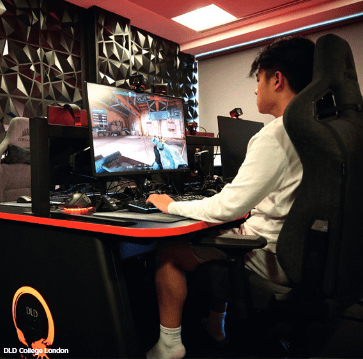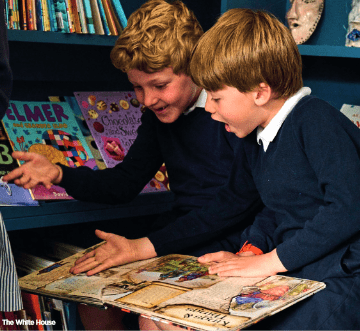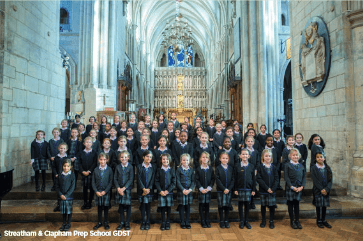Menu
Choosing the appropriate educational path for your child is as challenging as the choice is bewildering. Nicola Woolcock, Education Editor of The Times, guides parents through the maze of opportunities.
The choice of schools for parents remains as robust as ever – more so for those leaning towards private education according to the figures which show a growth in the number of independent schools in the last year.
Fee-charging schools are certainly not about to disappear, despite Labour’s plans to end their tax breaks if they win power in the general election next year. But the fees they charge have raised eyebrows, particularly in a time when so many are struggling with the rise in the cost of living.

Fees were frozen at many schools during the pandemic but schools are now making up for that loss of income. The latest Independent Schools Council census shows fees increased by 5.6 per cent in this academic year, the highest since the financial crash of 2009. Many expect next year’s to be even higher, with some boarding school fees north of £50,000 a year.
The average day school fee is £16,656, an increase of 37 per cent in the last 19 years, while the average boarding fee has risen by 41 per cent to £39,000.
Families remain keen, however, and prepared to dig deep. Growing numbers are supported and receive help with fees, £1 billion was received by pupils in 2022 from schools themselves.
“We have access to resources and expertise which is simply not available to our colleagues in the state sector,” argues Louisa
McCafferty, Head of Broomwood Prep – Girls. “This means our children have opportunities to explore beyond what is learnt in the classroom with the aim of educating the whole person – whether this is through specialist sport training, subject specific workshops or the state-of-the-art equipment in our DT suites or cookery school.
“Many of our staff are subject school specialists who have a passion and depth of knowledge you might not usually see at the primary level,” she adds.
Nonetheless, parents considering an independent school for their children should ask about school plans if Labour do win the election and implement their policy, which is likely to lead to VAT being charged on fees. Will the entire cost be passed on to parents? What contingency plans or support are in place?
London and its south-west neighbouring counties are, of course, teeming with strong schools, both state and private. Ernest Bevin Academy is the only boys’ state school in Wandsworth, at a time when the overall number of boys’ schools in the country is falling. It has just joined United Learning, one of the biggest academy trusts. Boys exceed national progress levels and many leavers head to Russell Group universities including, last year, medicine at Cambridge and computer science at UCL.
BUILDING MOTIVATION IN BOYS
‘It’s not that I can’t do it, it’s that I can’t do it yet!’ We adopt clear strategies to motivate the boys in our charge to want to expand their own potential.
Champion creativity and independence
We support boys’ individuality and freedom of expression, while challenging ‘permission culture’ and anxious perfectionism in relation to schoolworkBreak down the steps to success
We seek to support every child by breaking each task down into small, achievable steps that form part of a challenging trajectory for that individualCelebrate small wins
We offer well-judged praise for effort which reinforces self-esteem and motivationAccept that motivation can ebb and flow
We do not expect our pupils to be robots with equal levels of motivation every hour of every dayBelieve that ‘Everyone Can’
We run welcoming and inclusive classrooms, with a culture of high expectations for allSource: Eaton House The Manor
Of joining United, Tracey Dohel, the principal, said: “We know their aims resonate with our own; a high expectation of the quality of education and pastoral care, preparing students for life, and the quality of the environment and relationships.
“We take pride in our students’ development as well-rounded global citizens, achieved through exceptional pastoral care, academic education and enrichment opportunities.”
Many private boys’ schools have taken girls in recent years but Ernest Bevin Academy has no plans to follow suit, apart from its sixth form which is already co-educational.
“It helps keep a well-balanced community at a crucial time during their adolescent life,” Dohel says. Girls joining in sixth form are welcomed and given help and guidance about settling in, including an induction day to support their transition.

There is a quiet area of the sixth form centre that is just for the girls to meet and talk, knowing that they are in their own environment, and the pastoral support manager talks to the girls about their needs. The school attracts families from across neighbouring boroughs and says many join across generations, welcoming pupils whose fathers, uncles and grandfathers came to the school.
There is no dearth of private schools stretching out of London from Wandsworth and its environs, both single sex and co-educational, day and boarding. Eton, the most famous school in the world, has categorically stated that it won’t be taking girls but other big names are going co-ed. Winchester recently took female day pupils and plans to admit girl boarders from next September. Charterhouse now takes girls in all year groups. Westminster is reportedly aiming to become fully co-educational by 2030.
However, another boys’ school, Whitgift, has – like Eton – no plans to take girls. On the border of town and countryside, in South Croydon, it is equidistant from the vibrancy of Brixton and the verdant surroundings of Surrey National Golf Club.
It is a day school that also has around 100 boarders among its 1,500 pupils.
“If it’s a binary choice, we’re a town school rather than a country school,” says its headteacher, Chris Ramsay.
“Most of our boys come from Wandsworth, Balham and Clapham but some come up from Surrey and East Sussex. It’s one of its big strengths, that we have boys from a lot of geographical locations.
“Going single sex is not in our five-year plan, but that doesn’t mean it will never happen. At the moment we’re really oversubscribed as a boys’ school. We make a big thing of letting boys be boys but take very seriously educating them in their attitudes to women.
“We don’t just have sports; boys do dance, drama and jewellery-making.” Of the fees – £24,400 for day pupils and nearly £48,000 for full boarders, Mr Ramsay adds: “We’ve been pretty fortunate that parents are supportive but we have had more requests for fee assistance. The Whitgift Foundation offers a large number of bursaries and we also fund school bursaries as well.” About a quarter of pupils receive means-tested fee assistance. Many boarders start as day pupils then ask to board as they get older – “we are our own biggest feeder school for boarding,” Mr Ramsay says.

Girls wanting a single sex education are well catered for in south London with James Allen’s Girls’ School, Streatham and Clapham High School, Sydenham High School and Wimbledon High School, among others.
There is also a plethora of co-educational schools, both in town and further out – such as Alleyn’s School in Dulwich and Cranleigh School, close to Guildford in Surrey.
Jane Lunnon, Head of Alleyn’s, suggests they have the best of both worlds in “beautiful leafy Dulwich with the City twinkling on the horizon”. She describes the pupils as grounded, unselfconscious and a joy to work with. Outstanding academic results are not the only focus, music is a “massive thing”, as is drama and making pupils feel part of a warm, connected community outside the school.
“Our children are operating in the context of an incredible city and part of a great education enables connection with a whole host of different activities. A tenth of pupils are on bursaries of more than two thirds of fees.”
Most children come from only a few miles away and Lunnon adds: “I truly believe outstanding education comes in many forms; there is breadth of choice in this area. The challenge for parents is to take time to find the school that fits their child.”
Mark Peters, Diversity & Inclusion Head at Hornsby House in Balham, sees many advantages to a London-based education.
“One of the huge benefits of being part of a school community in London is the incredibly diverse nature of our city and all that brings,” he says. He believes a London-based school can work and collaborate with a variety of diverse organisations which help break down assumptions, stereotypes and apprehension in order to accept and celebrate our differences.
“We need to educate ourselves in the variety of religions, cultures and heritages around us. We want to help our children to be kind and embrace the diversity of London, to add richness to their lives and allow them to understand and celebrate everyone’s uniqueness.”
Nonetheless, for those with a rural preference, there are plenty of choices not far from the M25. Although principally a boarding school, a quarter of Cranleigh’s pupils are day students while most of the boarders go home for the weekend after Saturday sporting fixtures.
When interviewed, Martin Reader, the head, had just returned from a nature walk around the grounds with pupils, spotting 20 species of bird and five of butterfly. Pupils can play cricket, golf, rugby, tennis or just wander
around the 280 acres.
“The location makes a difference, especially for London parents, who like the focus on the countryside,” he says. “Pupils are out playing rather than sitting on a bus at 6pm.”
Around 35 pupils of the 700 are still full boarders showing how widespread flexi-boarding has become. Most hail from Surrey, Sussex and London and Mr Reader says the school would like to attract more foreign boarders to help pupils become global citizens.
THINKING BEYOND ACADEMICS
With the increased competition for schools at 11, both independent and maintained, it is easy forget that children won’t necessarily peak at the end of primary school. Boys and girls are specialising at younger and younger ages in music and sport, when evidence suggests that trying their hand at a variety of activities develops a greater number of transferrable skills that serve them better as they enter their teens.
Encourage your children to give all the co-curricular areas of school a try, keeping the door open across sport, music, art and drama, and even if they’re not top team material or don’t make the selective choir by Year 6, they will have the confidence to give it a go at secondary school. It’s not just about achievement in these areas but creating shared memories and experiences as well as providing a fantastic way to make friends quickly, so important as they navigate the challenging teenage years.
Source: Source: Hornsby House School
There are equal numbers of boys’ and girls’ boarding houses and plenty of mixed sports and activities. “We get very good results, but our value added is very important,” he adds. “We’re a selective school but not super-selective, we give siblings priority and want pupils to be rounded in sports, music and drama.” Some families dip in and out of private education, choosing state primaries followed by independent secondaries or vice versa, depending on the child or what is available in their area.
While south-west London and the adjoining home counties have big name secondary schools, they also have small and nurturing fee-charging preps. The Roche School, which caters for two to 11-year-olds, says its homely atmosphere is at the core of its mission. Headteacher Vania Adams was a teacher when it was founded in 1983 by Carmen Roche, and she returned 14 years later.
She said: “Our unique selling point is the lifelong happiness of the children. That means not only teaching them with academic rigour but providing as broad and enriching a curriculum as is possible, with opportunities to challenge and open their minds. It also means developing them as human beings who will do good in the world. A home-from-home feel and high-quality teaching remain at the core of our mission.”
The school claims it goes beyond local state primaries and other independent schools, with small class sizes, additional maths and English groups from Year 1 upwards, more sport than average and PE lessons with specialist teachers, and a bespoke 11+ service with secondary-trained teachers to provide challenge. Parents attend a series of meetings to help choose the right senior school for their child and three dozen pupils achieved scholarships in the 11+ this year.

The school is very much a London establishment, saying: “We have a diverse cohort that reflects multicultural London (29 languages spoken) and a forward-thinking approach to equality encapsulated in our vision of fostering global citizens.” This extends to having a Spanish bilingual stream, starting in Reception and running until Year 2. Three times as many families chose this route as expected in the first year, and few had an existing connection with Spain.
Fees are up to £6,420 a term and Adams said: “The climate continues to be difficult as we are one of the few remaining schools that is family-owned and run. However, we place our resources where it matters most: with the pupils.”
Whether a busy London school, a day school in town or in the countryside, or boarding – there is another option where families see more of their children without having to find the time and the knowledge to home-school.
Virtual schools existed long before the pandemic, but it was only during lockdown that online learning became almost universal through necessity. As restrictions eased and many returned to normal, in-person classes, some families found their children had flourished with remote learning.
Others are coming to it new, for a wide variety of reasons. Minerva’s Virtual Academy has seen the number of pupils increase by 50 per cent in the last year, from 200 to 300.
It says: “With every new enrolment, we hear unique stories and motivations. We’re seeing students who’ve experienced anxiety in traditional school settings finding solace in the supportive and flexible environment we provide.
“They’re able to engage with learning at their own pace, without the pressures often associated with physical classrooms. The same is also true for neurodiverse students, who often struggle to get the correct levels of support from bricks and mortar schools, and who can better focus within a sensitive learning environment that removes many of their triggers.”
The school also caters for exceptional athletes or musicians who need to fit their academic work around their commitments in other fields. Fees are £6,950 a year – a third that of many independent schools.
Headteacher Lawrence Tubb says: “Education like this has not been available to these children before now, many of whom are practically forced to stop learning at 16.” A key attraction for many parents is its commitment to personalised learning, he says.

Like growing numbers of independent schools – particularly with fast developments in artificial intelligence throwing doubt on the authorship of homework – Minerva uses flipped learning. This means pupils prepare in their spare time and complete work and discussion in lessons. Mr Tubb adds: “We are preparing our students for a rapidly changing world by equipping them with future-focused knowledge. This academic year we’ll be introducing lessons on the history and implications of AI for all age groups.” Pupils choose between 21 subjects for their GCSEs and 12 for their A-levels.
While it suits some children, how does the school ensure they are not lonely and isolated? “We place a large emphasis on creating a very strong community,” Mr Tubb says, “through weekly assemblies, a wellbeing programme and clubs. Every pupil up to Year 11 joins at least one club and may join more – from art to film production, debating to E-gaming.”
The school also hosts virtual talks by inspirational speakers, to which parents are also invited, has in-person meet-ups twice per term at venues around the UK, and organises social drop-in sessions.
Exercise and regular breaks are encouraged, during weekly wellbeing lessons. Mr Tubbs adds: “Families say they did not realise there was an alternative to bricks and mortar school, and would not have thought of it had they not seen how well their child was performing when learning from home during the pandemic.”